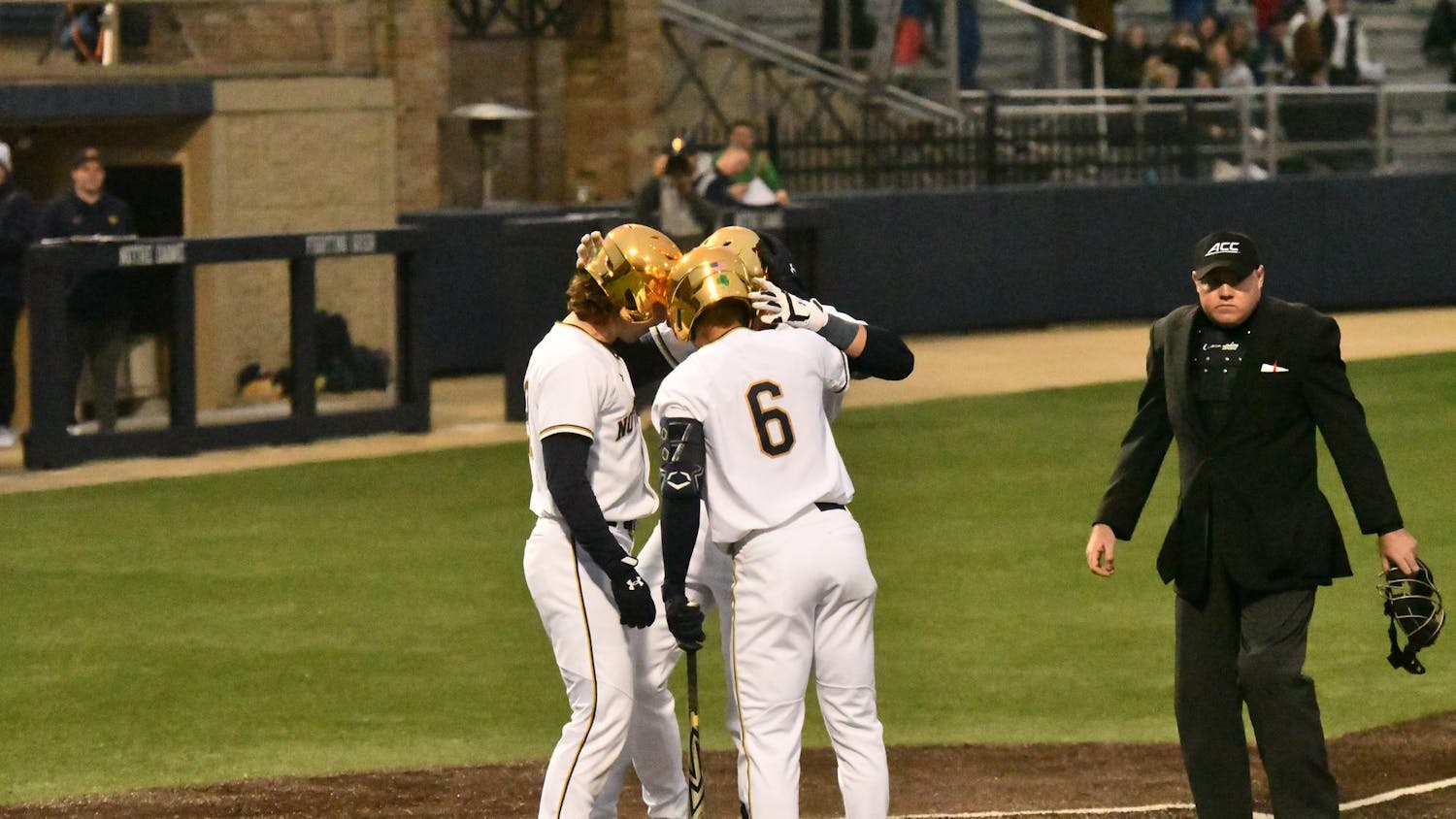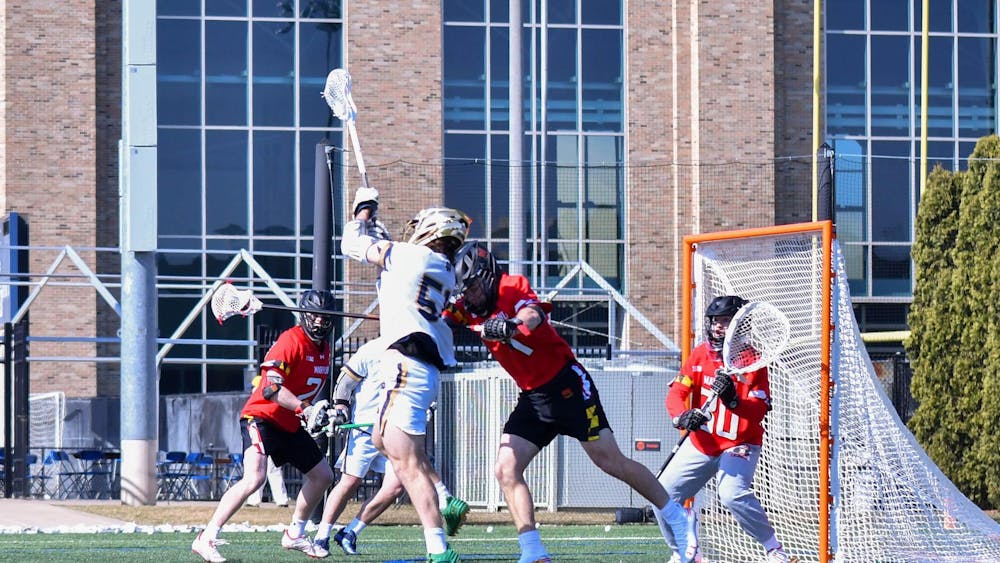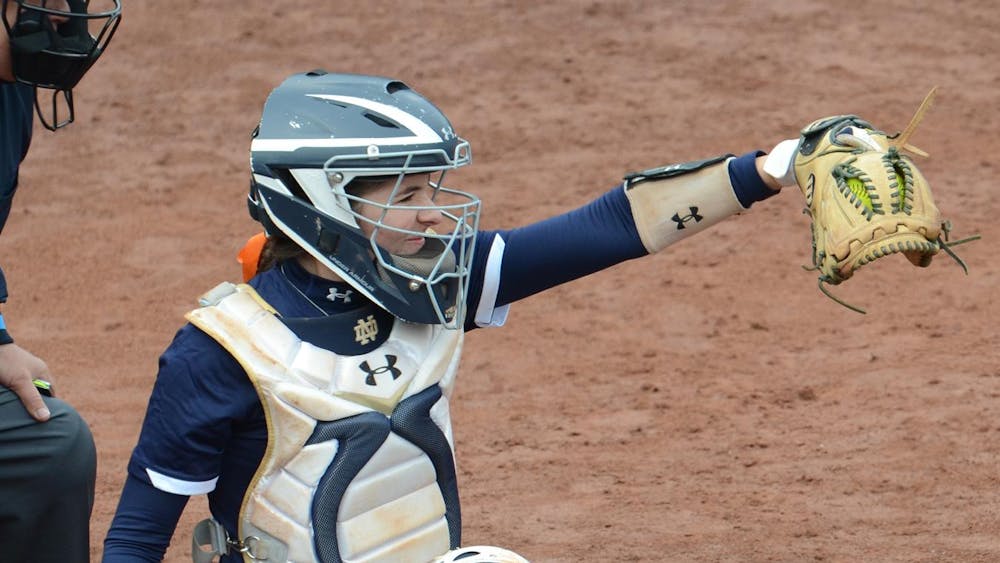In his first three seasons at the helm of the program, Notre Dame fencing head coach Gia Kvaratskhelia has achieved great success. Kvaratskhelia became the seventh head coach in Notre Dame fencing history in 2014 after joining the staff in 2007, serving three years as associate head coach and five as an assistant. In his time as head coach, Kvaratskhelia has produced an overall record of 196-23 for a .894 winning percentage and led the Irish to the team’s ninth and 10th national titles in 2017 and 2018, respectively.
Fencing has always been a part of Kvaratskhelia’s life.
“I grew up in Soviet Georgia, and picked up the sport in the beginning of the ’80s, and ran into it completely accidentally,” he said. “A PE teacher offered the classes and I signed up for it, and that was the beginning of the journey all the way to here.”
Kvaratskhelia began fencing when he was 13 years old, and he became a member of the Georgian National Foil team from 1990-1994. He immigrated to the U.S. in 1994 from the former Soviet Republic of Georgia, and after spending time building the Kanza Fencing Club in Salina, Kansas, into a nationally recognized club, Kvaratskhelia has overseen a thriving foil program — referring to one of the three types of fencing weapons — for Notre Dame.
“Fencing was a part of the Olympic movement from the beginning, so the Soviets really emphasized Olympic sports, and fencing was one of the popular ones because during the ’60s to ’70s and ’80s, Georgia enjoyed quite the success on the Soviets level and they won a few Olympic medals,” Kvaratskhelia said. “So fencers were maybe not recognized on the streets if somebody saw them, but fencing was widely engrained into the sports in Georgia, so it was a significant sport for the Georgian athletic development at that time.”
One of the main reasons Kvaratskhelia took up the sport in the first place, he said, was his desire to see the world.
“The Soviets had a pretty closed country, and to be able to see the outside world, athletics were probably the only avenue to do that,” he said. “So, my reason was I wanted to become a good athlete, and I also wanted to see the places. And if you were a National team member, that would give you the ability to travel and compete in different places all around the Soviet space, and if you were really good then you would be able to see outside the Iron Curtain. So that was one of my childhood dreams to be able to see the rest of Europe and parts of the world, but then I fell in love with the sport of fencing itself and tried to be as good as I could be.”
Kvaratskhelia took home the bronze medal at the 1990 Soviet Junior National Championship — shortly before Georgia declared its independence — and later had an impressive 11th-place finish at the 1992 European Championship.
Aside from being a successful fencing coach, Kvaratskhelia is also known for his communication skills. He is fluent in Russian, Georgian and English, and he received his bachelor’s degree in physical education and sport in 1993 from the Georgian State Physical Training Institute in his hometown of Tbilisi. He also earned a sports journalism certificate from that institution in 1992 and pursued graduate studies in journalism at Tbilisi State University in 1993 before coming to the U.S.
“I wanted to be a coach and then my interest shifted to journalism, and at the same time I was pursuing my fencing career with the National team. And then in the ’90s everything stalled because of the civil war,” Kvaratskhelia said. “ … I came to the States to continue to save my fencing career, and then I realized that my biggest desire was to be a coach and working with athletes. I got the opportunity to be a coach in Kansas — specifically Salina, Kansas — and I started my coaching career there, and 11 years later, I had a few athletes who played at the collegiate level.”
In his time in Kansas, Kvaratskhelia transformed Kanza from a small recreational club into one of the nation’s top foil centers. His fencers at Kanza — which included brothers Mark and Steve Kubik (who graduated from Notre Dame in ’09 and ’11, respectively) and brothers Teddy and Grant Hodges (of the Notre Dame classes of ’11 and ’13, respectively) — combined to win three USFA national men’s open foil team championships, with six of his Kanza fencers going on to compete at the Division I level as scholarship athletes. His Kanza fencers combined to be national finalists 15 times, while receiving nearly 50 national medals.
Kvaratskhelia noted that coaching was in his blood for a long time.
“Three of my generations — my great-grandfather, my grandmother and my uncle — are all teachers, so I think I found a big reward in coaching because of being involved in developing someone else.”
Now, Kvaratskhelia has steered his program to consecutive Atlantic Coast Conference titles on both men’s and women’s sides in three years. The Irish have yet to be defeated in ACC Championship duals and have claimed 15 of 18 individual weapons titles. Kvaratskhelia was named the 2015 ACC Men’s Coach of the Year, the 2016 Co-ACC Men’s Coach of the Year, the 2016 Co-ACC Women’s Coach of the Year and the 2017 ACC Women’s Coach of the Year for his efforts, and he has won back-to-back national championships.
Kvaratskhelia reflected on the most important piece of advice he has ever been given when thinking about his coaching career.
“[It] was from a friend of mine in Kansas who taught me to work with the people who you have absolute trust in, who are great professionals and always give them the ability to express themselves,” he said. “So I think we have a great core of coaches who I trust, and I know they have the absolute best in their hearts for our athletes. They are great professionals and I let them do their best, and supporting them, and giving absolute support to our athletes to make sure they know that we are not here just for their athletic development, but rather to develop their entire person.”













